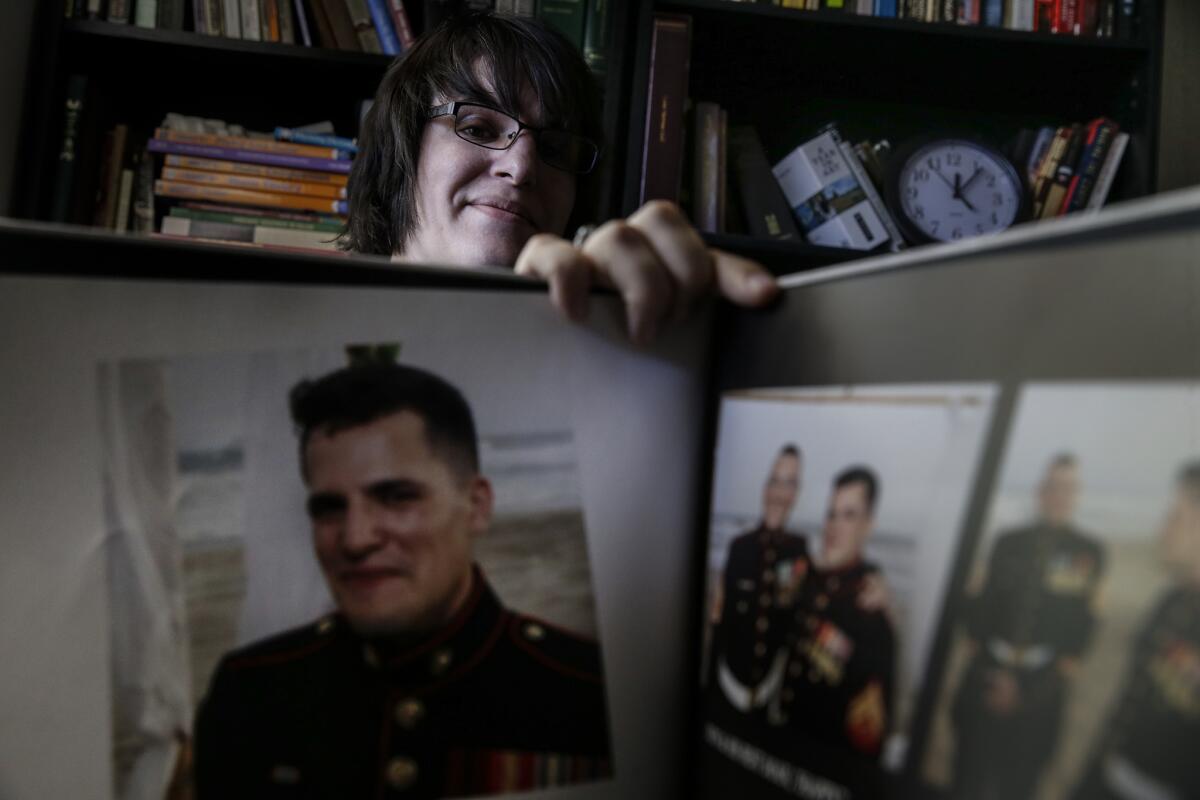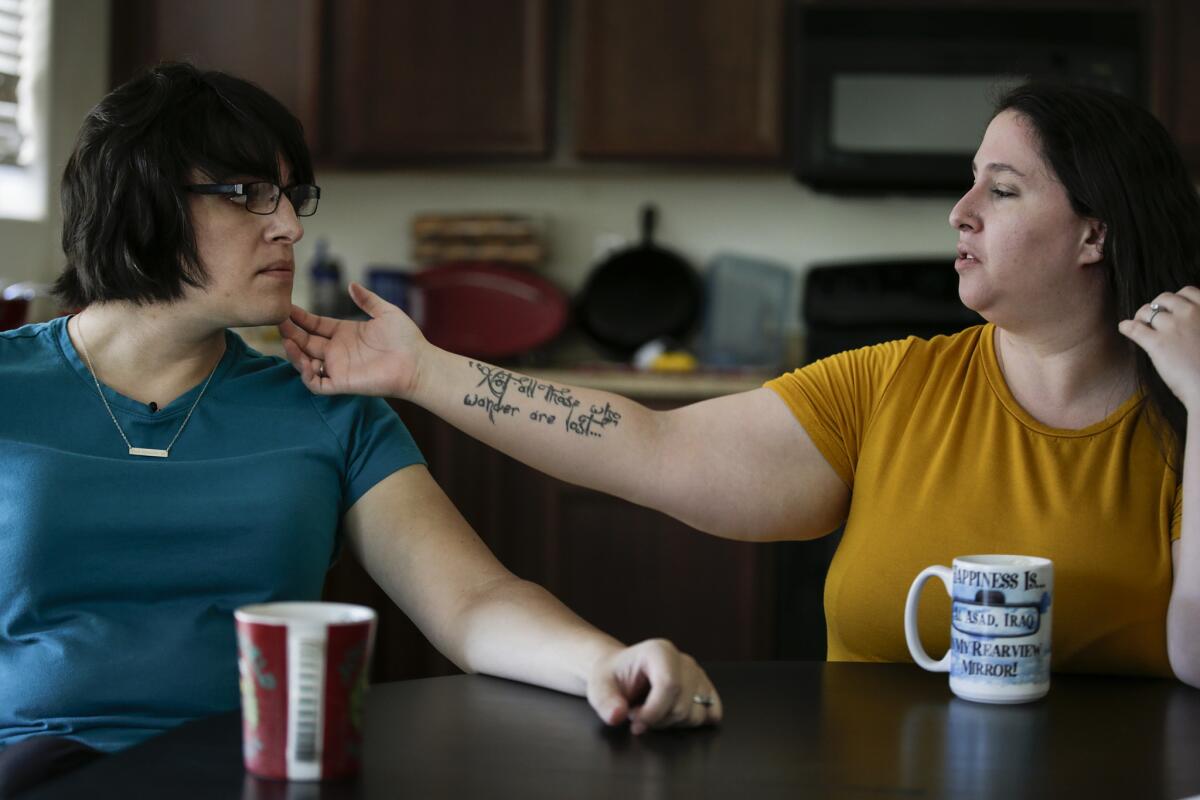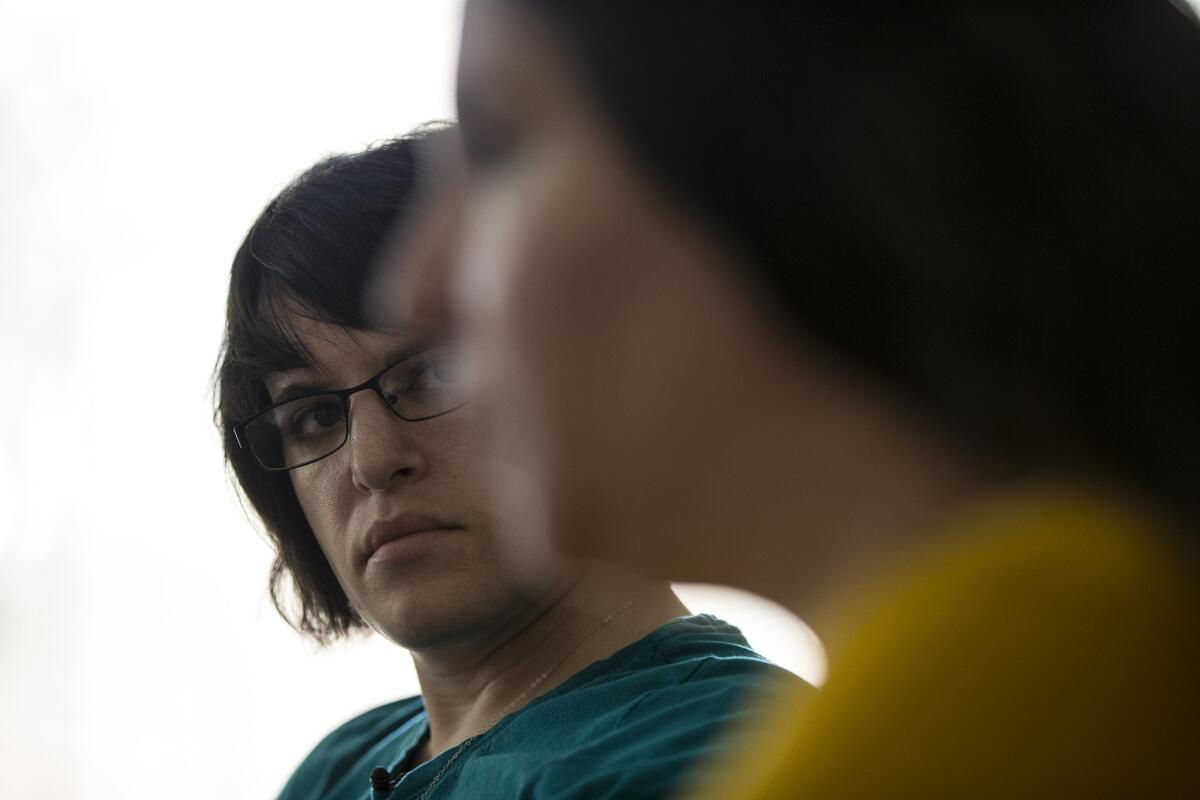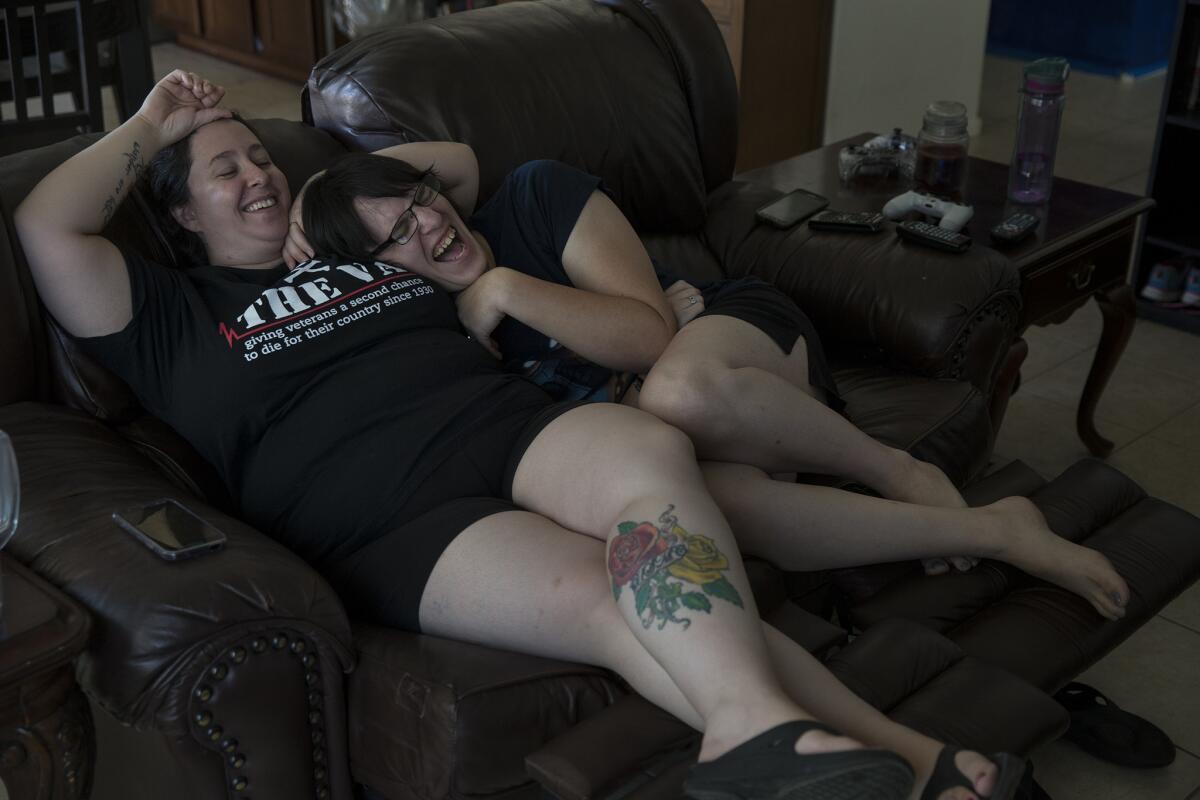A proud member of the military as a man, and maybe once again as a woman

Ellie Lader, formerly Don, relieves wife Jacquelineâs sore back. Both are Marine Corps veterans and survivors of the mass shooting in Aurora, Colo.Â
Reporting from Phoenix â When Ellie Lader woke up that Sunday morning, her wife was sitting up in bed looking at her phone.
âDonât read the news today,â she said, grimly.
Another mass shooting. Fifty people dead, dozens wounded at a gay nightclub in Orlando, Fla.
Ellie, a 31-year-old Iraq war veteran, went to the coupleâs computer and started writing on her Facebook page:
âIâve been hemming and hawing over how to say this and I think straight to the point is best. I spoke to an Air Force recruiter to go back on active [duty] with a commission because that is what the Air Force needs.â
She had been debating whether to return to the military and turning over âendless factorsâ in her mind.
âNow, none of the other factors I was considering matter,â Ellie wrote. âI knew I was needed after 9/11. I know Iâm needed now.â
It had taken years for her to reach this point. Along the way, there had been moments of intense fear and self-doubt.
And she still doesnât know whether she will be allowed back into the ranks.
It is a journey that began July 19, 2012, when a man named Don Lader took his wife to a midnight screening of the new Batman movie at a theater in Aurora, Colo.

Don and Jacqueline Lader had bought extra-large drinks and settled into their usual seats, in the eighth row, for the opening of âThe Dark Knight Rises.â About 20 minutes into the movie, a sliver of light to the right of the screen caught their attention.
James E. Holmes, one of the deadliest mass shooters in U.S. history, slipped in through an emergency exit and tossed a pair of gas canisters into the packed theater.
Some moviegoers thought he was part of the entertainment, but the Laders, both Marine Corps veterans, instantly recognized the acrid smell of tear gas.
As the first gunshots rang out, Jacqueline dropped to the floor, and Don threw himself on top of her. There were explosions all around them. Then silence. One of the shooterâs magazines had jammed.
Don pushed his wife toward the aisle and yelled, âRun!â
Twelve people died and 70 were injured that night at the Century 16 multiplex.
Don and Jacqueline had been trained to face gunfire in Iraq. But after the violence at one of their favorite hangouts, 10 minutes from home, both sought counseling from a Department of Veterans Affairs therapist.
The nightmares didnât stop. Don couldnât forgive himself for not going back into the theater to try to save more people.
They moved to San Diego, hoping to make a fresh start. Don started law school, but it wasnât a good fit. Neither, it seemed, was anything else he tried.
They moved to Arizona and bought a two-story house in the suburbs, about an hour outside Phoenix. Itâs close to Jacquelineâs family and that of her daughter from a previous marriage.
Still, Don was miserable, and Jacqueline couldnât figure out why.
âI kept throwing stuff at the wall to see if it would stick,â she said.
Was he bisexual?
Yes, thatâs it, he said. That had to be it.
Don grew up in an abusive home, where he said any attempt to express his femininity was quashed. His decision to join the Marines at 18 was in part an attempt to âbe a man.â If word had gotten out that he felt like a woman, it could have destroyed his career.
Still, Jacqueline kept pressing. Late one night, he admitted the truth.

On May 26, 2015, just weeks after the couple celebrated their seventh wedding anniversary, a new picture appeared on what had been Donâs Facebook profile.
Gone was the heavyset man with rumpled hair and a dark, bushy beard. In his place: a neatly coiffed woman wearing dangly earrings and a hint of pink lipstick.
Her name: Elliot Jane Lader, after the 19th century female novelist who wrote under the pen name George Eliot.
âEvery day where I wasnât living to my fullest was another day that James Holmes still had control over my life,â Ellie said. âI had a second chance at life.⌠Why should I let fear get in the way of me being who I am?â
Jacqueline, 31, embraced Ellieâs transition. It was, in a sense, a coming out for her, too.
âI have been queer my whole life,â she said. But she had kept that hidden while in the Marines. The militaryâs âdonât ask, donât tellâ policy, which barred gays and lesbians from serving openly, was still in effect.
Soon after beginning the transition, Ellie signed up for classes at a school that teaches âhealing artsâ â massage, herbalism, beauty. What better place, she figured, to learn about being a woman?
Through the VA healthcare system, she found a sympathetic endocrinologist who got her started on hormone replacement therapy. The VA doesnât cover gender-reassignment surgeries, however, so the couple had to save nearly $5,000 to have Ellieâs testicles removed.
Then there were the laser treatments to remove her facial hair. âThat was our tax refund,â Jacqueline said.
Still, they count themselves lucky. Many transgender people canât afford the treatments they need to fully express their identities. Within months, Ellie began developing the curves she wanted. Her face softened. She lost weight and grew her hair into a feminine bob.
She felt different, too.
âIâve never cried as much in my life,â she said. âIâve never cried as many tears of joy.â
It was time to tell Jacquelineâs daughter, Julia.
While Ellie was at school, Jacqueline sat the 8-year-old down in front of the TV and showed her news reports about transgender children. What would she think, Jacqueline asked, if daddy felt that way?
When Ellie got home, Julia ran up and hugged her.
âIâm sorry you had to hide so long,â the girl said.
The response from the coupleâs military friends was also overwhelmingly supportive. Others havenât been so accepting.
When Ellie started wearing womenâs clothes, some neighborhood kids laughed and stared. Strange men propositioned her in the grocery store parking lot. A fellow student groped her during a massage class.
She has never felt so vulnerable.
It doesnât matter that she served two tours in Iraq. âIâm a transgender woman,â she said. âPeople see that first.â
Now Jacqueline is the one trying to shield her spouse from danger.
For a time, she wouldnât let Ellie out of the house alone. She worries about holding hands in public. She doesnât want to draw attention, in case someone notices that Ellie is transgender.
âItâs safer that people perceive us as gay here,â she said.

Ellie had become a licensed massage therapist, but something was missing. Two days before the Orlando massacre, she told an Air Force recruiter about her time in the Marines and Air Force reserve. She didnât mention the sex change.
Pentagon policy had long barred openly transgender people from serving in the military.
On Thursday, Defense Secretary Ashton Carter announced the ban is being lifted, with full implementation of the policy change scheduled for July 2017.
Ellie had known the change was probably coming, but found the wait maddening.
âMy skill set is still needed, and Iâm able, and therefore as far as Iâm concerned, Iâm obligated to help,â she said before the announcement. âAnd this time I know I can do it better â because I am who I am now. I donât have to hide my true self.â
Days after the Aurora shooting, when Jacqueline and Don groped for words to make sense of the horror, he made a quiet observation.
âIâm not afraid of dying,â he said back then. âIâm afraid of not living.â
Ellie says that after Orlando, she finally understands what that means.
When the gunman opened fire at the Pulse nightclub, it felt like he was taking direct aim at her family. Worse, it felt like parts of the country were shrugging it off.
The couple saw the Stars and Stripes flying at half-staff over some buildings. But other flags were flying high, as if nothing had happened. They asked themselves: Would the reaction have been the same if the victims hadnât been gay?
Ellie decided she had to stand up, not only against Islamist terrorism but extremism in all forms.
The day after Orlando, Ellie called back the recruiter. She told him about the sex change and said she knew she would have to wait to serve, if she can still meet the physical requirements. But she asked him to send her the paperwork anyway.
When the policy changed, she wanted to have her packet ready.

ALSO
YouTube star charged with filing false police report after saying he was beaten near WeHo gay club
âEarthquake?â Google promises faster information â and a map
UPDATES:
June 30, 1:26 p.m.: This article was updated with news of the Pentagon lifting the longstanding ban on openly transgender service members.
This article was originally published on June 29 at 4:46 p.m.
More to Read
Sign up for Essential California
The most important California stories and recommendations in your inbox every morning.
You may occasionally receive promotional content from the Los Angeles Times.








